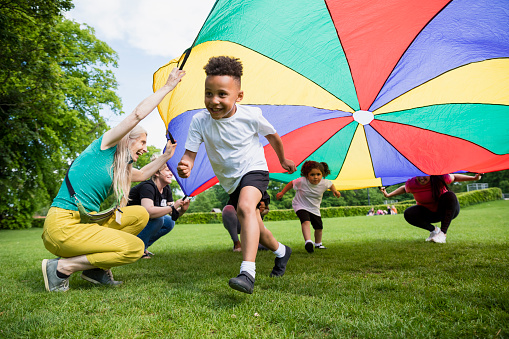Jesus is crazy about children. He calls them to himself (Mark 10), names them a blessing (Psalm 27), and tells us we are His (Galatians 3). Jesus warns us against harming them (Matthew 18) and instructs us on how to encourage and discipline them (Proverbs 22).
Children, like adults, are complex. Caring for them well requires us to think holistically. They walk through our doors carrying with them the stories of their lives.
How can we hold their stories well? What kind of strategies can we use to meet their needs spiritually, physically, educationally, emotionally, and socially?
However we engage in this important work, it’s clear the stakes are high. Consider these creative and thoughtful approaches to supporting the children you serve.
Emotional
Be fully present and actively listen to one another. It’s important to take the time to hear their concerns and answer their questions with developmentally appropriate answers. We know from science that being heard by someone who has given you their full attention and is without judgment is profoundly healing.
We can care for children emotionally by carefully explaining changes. Make sure children have warnings and explanations on what to expect, whether it’s about schedules, vacations, or teacher changes.
Uncertainty can cause even otherwise emotionally healthy children to feel insecure. Answer their questions, give them time to express themselves, and infuse your language with gratitude. Consider hanging an emotions chart where children can regularly identify what they are feeling.
Connection Helps Regulate Emotions
Think through how to create connections between the children themselves and between them and the adults within your ministry. Are we talking at children, or with them? Are we remembering important details and being relationally intentional? That intentionality fosters connection and connection equates to care.
A regulated adult helps inform a child’s response in any new and unsure circumstance. Staying calm when talking about a situation is critical. When the adult has big feelings, the children follow.
As a result, ask yourself: What can I do when my emotions are out of control, and I feel dysregulated? Who can I share them with safely? What information do I need? What is my own pathway to regulation?
A regulated adult helps inform a child’s response in any new and unsure circumstance.

Offer Choices
When some things in life may feel out of control, offering choices can help. What should we do for a game? What snack should we try today? Is there a song you were hoping we’d sing? Would you like to do a craft?
Sharing power goes a long way in caring for children.
Have a Quiet/Calm Corner
When kids are having a hard time emotionally, this kind of intentionality sends a clear message. I want you around no matter how you are feeling or behaving. I care so much about you; I’ve made a special space for you to be when you are having big feelings.
Spiritual
Before we think about teaching children what we think they need to know, have we shared with them what God has taught us? Being vulnerable and giving children the impression that God is good, and we’ve found He can be trusted, goes a long way in caring for them.
Give them the opportunity to serve. Zechariah 4:10 says, “Do not despise these small beginnings, for the Lord rejoices to see the work begin.” Don’t measure the size of the project, or who it will help. Pastor Andy Stanley says, “Do for one what you wish you could do for them all.”
Think about what interests the child and how you can turn that gift or skill or energy into something they can share with others.
Social
Maintaining routine increases felt safety. We need to do all we can to keep activities predictable, so adults and children sense stability. Have a plan for the day. Communicate it right away, so everyone can share the same expectation. Even simple details will give the day/class/small group a sense of certainty.

Stick together. What are some ways we can minimize a child feeling isolated? Think about how the tables are set, teams are selected, and free time is managed. We want to care for children who feel on the fringe by incorporating them into every aspect of our time together.
Words and experiences build healthy belief systems, so facilitate social interactions where people can give each other good words and share meaningful experiences. Your environment may be one of the only places they are receiving a continual diet of positive words and spiritually significant experiences.
Physical
Stress weakens our immune system, making us more susceptible to illness. During our daily activities, we can pay attention to the tone of our voices and the condition of our hearts.
We can ask ourselves: Am I taking care of myself? Am I adding to, or reducing, the levels of stress in my environment?
A dehydrated brain is an irritated brain. We know hydration is an effective intervention for aggression. Am I paying attention to how much water I am drinking? How much they are drinking?
Children need food, water, and physical activity every two hours. Am I creating space for that kind of physical care?
Educational
Foster creativity. It’s a gift we give children when we ask questions about what interests them and listen to their wonderings. Oftentimes, learning to learn is more important than any actual knowledge we may pass along.
How can we model our own learning and foster curious environments?
Play is one of the greatest tools we have for learning. Fun and delight release good dopamine and serotonin in our brains. Make education fun by connecting it to play!
We can always learn how to care for ourselves better and how to care for the children we serve. This is not a checklist or a course to follow, but a posture of thinking of their needs from their perspective.
In the end, if we can leave them the impression that we, who love Jesus, also care deeply and practically for them, that’s a job well done.
More Articles by Beth!
- 42 Exciting Service Project Ideas Tested in the Real World
- Giving Kids a Heart of Compassion in a Me-Focused World
- Why You Need to Serve Kids in the Foster Care System
- Racial Injustice and Reconciliation: An Interview
- The Need for A Rescuer (Elementary Lesson)










